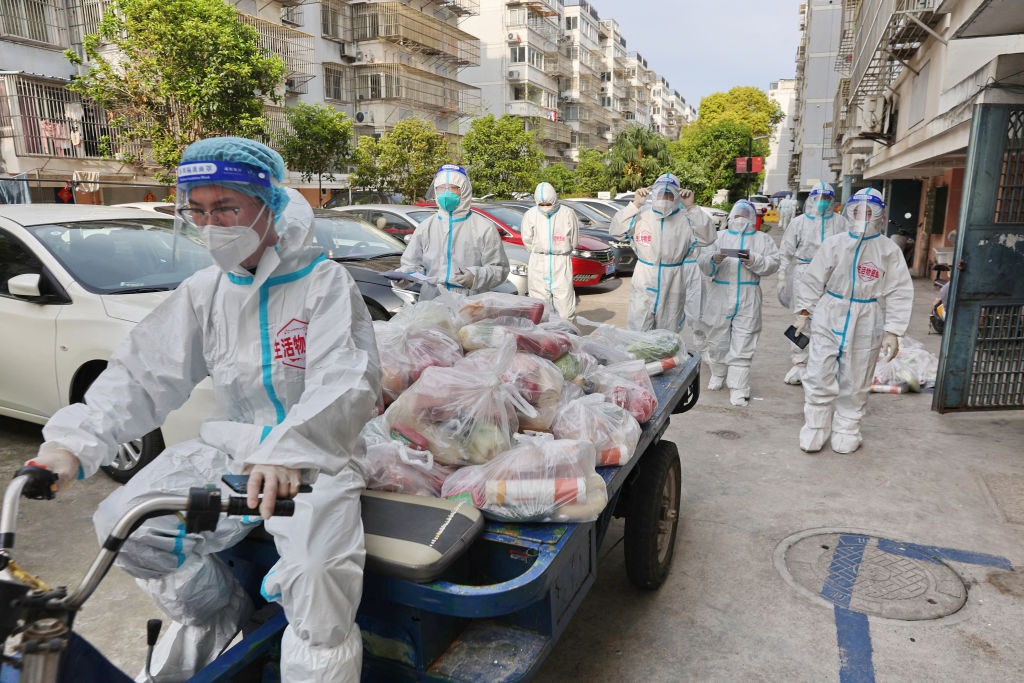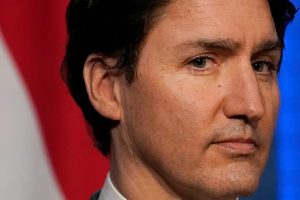The year of totalitarian failure
Perhaps the great theme of the first quarter of 2022 is the way in which the West’s main adversaries have come crashing down to earth. In Ukraine, Russia’s army has been revealed to be something of a paper tiger. Before the invasion, it was assumed by both the Kremlin and Western officials that Ukraine was there for the taking, and that a successful invasion could not be stopped. Events have proven otherwise. That doesn’t mean an angry, nuclear-armed and callous Vladimir Putin isn’t dangerous, but the Russian threat has been found to be in many ways less worrying than many thought it was before February.
Garnering less attention but arguably as significant is China’s Covid nightmare and the unravelling of the Chinese regime’s claims of pandemic competence. Since the start of the pandemic, a certain kind of Western technocrat has marveled at the proficiency with which the Chinese Community Party kept the virus under control.
There were always major problems with the adulation heaped on the Chinese approach to Covid. Lab leak or no lab leak, the CCP initially chose to censor early reports of a coronavirus outbreak rather than contain it. It was never clear that the Covid-fighting measures they deployed were compatible with a free, democratic society. And official Chinese case counts — the basis for claims of a stellar response — are not something that should have been accepted unquestioningly.
But the latest wave of Covid cases — and the CCP’s response — should put paid to any idea of the superiority of China’s response. A hardline Covid strategy and the regime’s refusal to offer the Chinese people a Western-made and effective vaccine have combined with the prevalence of highly transmissible forms of the virus to eradicate any kind of propaganda victory that Xi Jinping may have been able to claim from the pandemic.
With hundreds of millions trapped at home in inhumane lockdowns imposed across China and case numbers surging, the pandemic script has been flipped. China’s useful idiots in the West have gone quiet. As have those on the left and the right who have spent most of the pandemic marveling at China’s “state capacity.” That footage of a dance music festival in Wuhan a year or so after the city was in full-scale lockdown feels like a relic of a previous era. As do op-eds in American newspapers, like this 2021 effort by the New York Times’s Li Yuan, in which it was claimed that China’s public health totalitarianism was offering its people its own version of freedom. Now we see horrifying glimpses of life in locked-down Chinese cities: wails of despair ringing out across the rooftops, people jumping from their balconies, driven to suicide by lockdown as omnipotent hazmat-suited health officials patrol the streets and robot-dogs wander around spouting propaganda.
Given Covid fatigue and an understandable preoccupation with the horrific news in Ukraine, it’s not hard to see why China’s Covid failure isn’t getting the attention it deserves, but its geopolitical significance should not be underestimated. Writing for Forbes, Anne Stevenson-Yang argues that China is “facing what is arguably the worst crisis in governance since the end of the Cultural Revolution in 1976.” Unlike Tiananmen Square, it cannot be hidden.
Thanks to the CCP’s Covid failures, China’s global dominance, often presented as an inevitability, feels less certain than it has for years. Not only do rolling Covid-zero lockdowns demonstrate the inhumanity of the CCP regime, but they come with a high economic price. And they may prove to be a powerful driver of the decoupling of the West from China’s economy.
When it comes to the bigger picture, Russia’s and China’s 2022 failures share important characteristics. Whether it’s the military weakness that comes with a corrupt system and a leader to whom his advisers do not feel safe delivering bad news, or a totalitarian regime deploying the might of the state in pursuit of one objective at the expense of all else, the lesson is the same: authoritarian regimes are not as competent as they seem.
*** Sign up to receive the DC Diary in your inbox on weekdays ***
Where is McConnell splashing the cash?
Economists are always keen to emphasize the difference between stated preferences and revealed preferences. That is to say, the difference between what you say you want and what the way in which you allocate time, money and other resources says about what you want. The latter, practitioners of the dismal science argue, counts for more than the former. That’s why it is worth paying attention to where the Senate Leadership Fund, the Mitch McConnell-aligned super PAC, is preparing to splash the cash ahead of the midterms. Burgess Everett reports those numbers for Politico this morning. The PAC has booked $141 million in fall advertising, with Georgia ($37 million), North Carolina ($27 million) and Pennsylvania ($24 million) attracting the largest sums. SLF will spend $15 million in Nevada and Wisconsin, $14 million in Arizona and $7.4 million in Alaska.
In three of those races, the aim is to topple a Democratic incumbent. In two, the aim is to make sure a retiring Republican is replaced by a member of the same party, and in another two, the aim is to win re-election for a GOP incumbent. Notably, SLF is not planning to spend any money in New Hampshire, where Democratic incumbent Maggie Hassan’s re-election is far from assured, especially given the famous capriciousness of Granite State voters. But in a 50-50 Senate, control will be decided in a handful of races.
A bipartisan Easter fright
This morning, Joe and Jill Biden welcomed families to the White House for the annual Easter Egg Roll. Last year the president and first lady appeared on the balcony with a masked bunny. This year, the mask was off and the event was back to normal. But mask or no mask, Republican president or Democrat, one thing remains the same: the White House’s creepy bunny suit. Is it any wonder some kids find the Easter bunny terrifying?
What you should be reading today
The Spectator Editors: In search of a Biden doctrine
Bill Zeiser: Elon Musk is the wrong kind of billionaire
John R. MacArthur: Free speech folly at the New York Times
Ben Jacobs, Washington Examiner: The unconventional congressman
Kurt Wagner, Bloomberg Businessweek: How Jack Dorsey quit Twitter to become Bitcoin’s spiritual leader
Nahal Toosi, Politico: The Russian ambassador is Washington’s least popular man
Poll watch
President Biden Job Approval
Approve: 40.6 percent
Disapprove: 52.1 percent
Net approval: -11.5 (RCP Average)
The top issues in their communities, according to black voters
Violence/crime: 17 percent
Economic issues: 11 percent
Housing: 7 percent
Covid-19 and public health: 6 percent
Infrastructure: 5 percent (Pew Research Center)


















